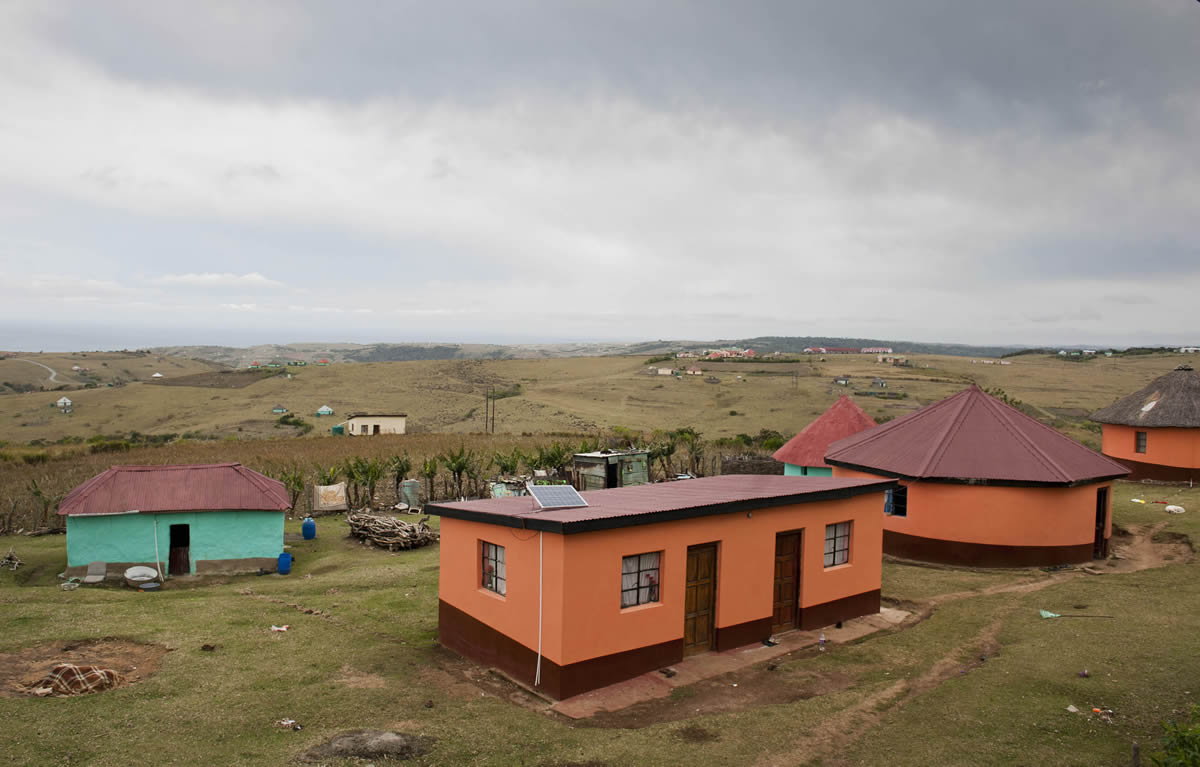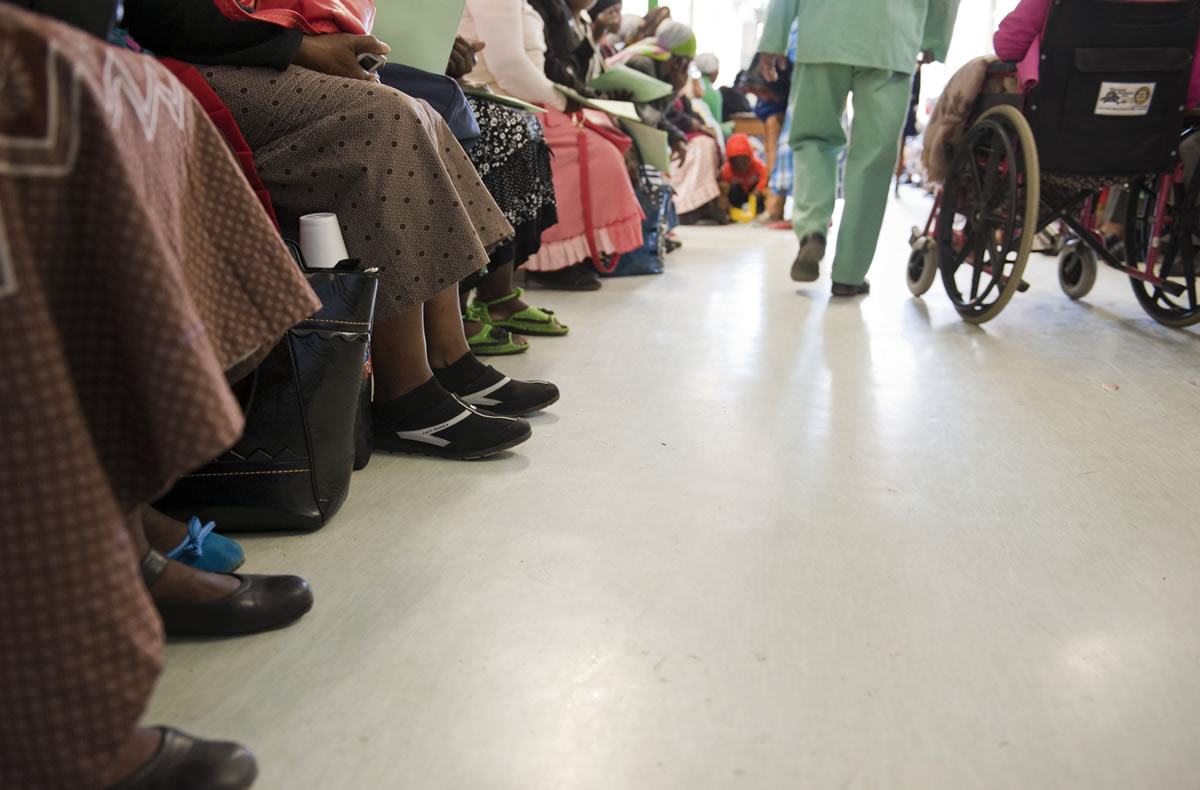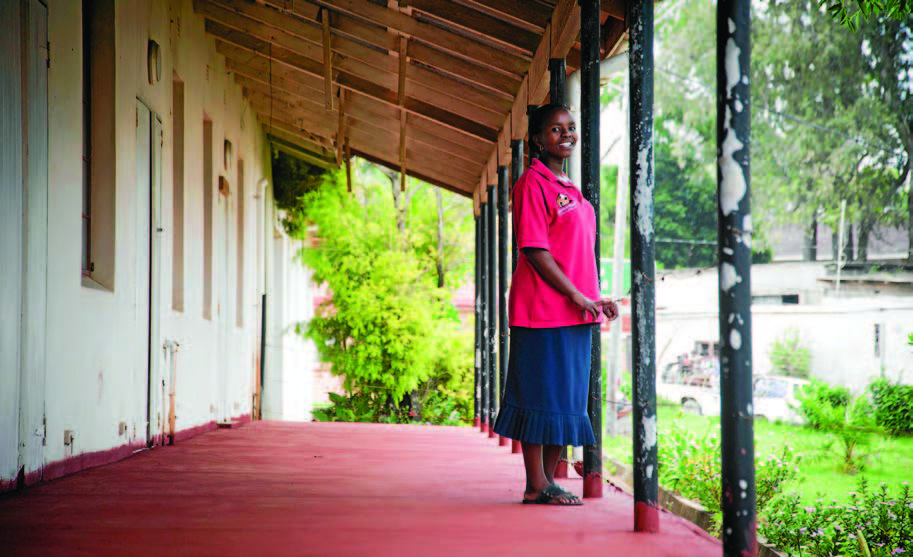The kidnapping of young girls ignores the ‘niceties’ of a cultural practice.
Babalwa Ntutu’s* parents thought their prayers had been answered. They were looking forward to spending Christmas Day with their daughter — even if it was at her hospital bedside.
But, on Tuesday last week, shortly after the Mail & Guardian had visited Ntutu at the Zithulele Hospital, 85km from Mthatha, the emaciated teenager died from multiple injuries she had suffered about three months ago. Her family is left with memories of the daughter whose grandmother once described as “clever and strong-willed, with good stamina for sport”. But there were no sign of these characteristics during the past few months.
She lay withering away in the isolated medical facility. She had been in a coma since early August, severely brain damaged, her body contorted by frequent fits. She was fed by a tube inserted through one of her nostrils and had to wear nappies as she was no longer able to control her bodily functions.
“In September, the girl turned 19 without knowing it,” said her grandmother. “That time was grey. There was no colour in our lives. There was no party but we tried to think that good things were around the corner.” But as Ntutu deteriorated, or “decayed”, as her grandmother put it, so hope for her faded. The grey darkened to black.
Her grandmother remembered the day nurses turned Ntutu on to her stomach. “It was shocking. The bed-sores on her buttocks had become so bad. The one on her left hip was so deep that you could see the bone.” She said her beloved granddaughter “got thinner and thinner”. Then the old woman added: “A skeleton would be better because a skeleton is meant to look like that, not a human being.”

‘She was unconcious and lay in a pool of blood’
She recalled how policemen found Ntutu by the side of a gravel road near her home village in the Zithulele district. She was unconscious and lay in a pool of blood. The last that had been heard of her was a frantic cellphone call to a friend on a Friday afternoon. Ntutu had screamed into the line: “The people in the car are running away with me! They won’t stop!” Then, said her friend, “the line went dead. Suddenly there was nothing.”
After searching for Ntutu for several days, her mother and sister found her in a hospital in Mthatha. In October, she was transferred to the Zithulele Hospital so her family could be closer to her. “Babalwa never spoke again so we don’t know who abducted her,” said her granny. “But we know she felt the pain. She moaned and even cried when the doctors touched her wounds.”
Ntutu was on her way to a school function in a nearby community when she fell victim to “kidnappers” — as her family described her attackers. They are convinced she suffered her horrific injuries when she jumped out of the car in an effort to escape.
Zithulele Hospital’s head doctor Ben Gaunt said: “Abductions frequently happen in the area but we have not yet seen someone at the hospital this badly injured as a result of one. We are, however, experiencing an increase in the number of 14- and 15-year-old girls who are getting married and then coming to us to give birth. I recently had one girl giving birth twice in one year — once when she was 14 and then she had her second baby when she turned 15.”
Some of the basic elements of the practice are missing in Ntutu’s case, but Gaunt said her death could be linked to an ancient Xhosa and Zulu traditional practice called ukuthwala. Until relatively recently those monitoring the tradition were convinced that it had “died out” in the area. But Gaunt and many Zithulele residents said that ukuthwala had resurfaced — in an unprecedented, violent form.

‘Ukuthwala is a perversion of an earlier tradition’
According to the tradition, young women are abducted and forced to marry strangers. Nomboniso Gasa, a researcher and analyst of gender, politics and cultural issues and former chairperson of the Gender Equality Commission, has been researching “the revival” of ukuthwala for more than three years.
She said the practice was a perversion of an earlier tradition, which largely applied to individuals of the same age group. “Although ukuthwala has always been patriarchal, it has been twisted into a much worse form than it was before,” she said. “Now, females who are getting thwala-ed are as young as 12.”
After a group of men has abducted a girl, she is taken to a man’s home and, after a short ceremony, she and the man are pronounced man and wife. Traditionally, the girls and young women had no say in the matter — even if her parents had given their blessing to the abduction and subsequent marriage. But, said Gasa, in an increasing number of cases, the girls’ families were caught completely unaware with no marriage negotiations having taken place.
Teenage pregnancies
A 15-year-old girl in the Zithulele area told the M&G: “We see ukuthwala and hear of it almost everyday. Young women and schoolgirls are kidnapped to get married and bear children. We are nothing here, just babymakers.” When school is out in the region, the signs of ukuthwala become evident, although it might not be immediately obvious. Girls, some as young as 13, hide bellies bloated by pregnancy under oversized school shirts.
“In a group of 10 of these really small girls, there are usually about three who are pregnant, some because of ukuthwala,” said Ncedisa Paul, a fieldworker for a local health initiative. Makoti [young bride] skirts are wrapped around some of the pupils’ school dresses. “Very few of these girls complete their education,” said Paul.
“Look, some of them are even wearing rings, just like married women,” she pointed out to the M&G during a recent visit to an area near one of Zithulele’s major schools. “They’re mostly married to men much older than them, like a 15-year-old girl would be married to a 30- or 40-year-old man who works on the mines in Johannesburg. People say it’s just the way it is — it is part of their culture, they say.”
Why has ukutwhala resurfaced?
Gasa said two “important” questions needed to be asked about the situation: “Why has ukuthwala resurfaced at this point in time and why in such a vicious manner?” She has been trying to unravel these questions. She said her investigations had revealed “highly disturbing” trends. She focused on areas of the Wild Coast and KwaZulu-Natal where ukuthwala was “resurgent”.
She said that HIV infections and Aids-related deaths were “significantly” responsible for the increase in ukuthwala. “Families and clans faced with the looming loss of lineage due to the high amount of people in their clans dying of HIV-related illnesses are encouraging their sons to marry early or getting brides for older men, who have been married before and have children. They are advocating early coupling and forcing the girls to marry young so that their families won’t disappear.” She said that victims of ukuthwala were forced to bear children “fast and in quick succession” to keep clans alive.
Gasa said the practice was perpetuating a “cycle of trauma”. “While clans have suffered the great trauma of losing their loved ones to Aids, young girls are traumatised by being forced to carry that burden and to step in to save the clan from complete extinction. The girls are being sacrificed at the altar of the continuity of the clan. “To make things even worse, their new husbands often infect them with HIV, and so the tragic circle is completed.”

According to the government’s latest antenatal survey, OR Tambo district, in which Zithulele falls, has the second highest HIV-infection rate in the Eastern Cape. More than one out of every three pregnant women who attend government clinics are infected with HIV. The survey also indicated that in 2009, one out of five pregnant girls between the ages of 10 to 14 years tested HIV positive.
Paul said the infection rate was even higher among girls who did not use state facilities but gave birth at home. The project she works for, Mentor Mothers, of the non-governmental organisation Philani, advises women on the health of their children. “Sixty-five percent of the mothers we deal with are teenagers between 13 and 19 years old. I don’t have official figures but I roughly estimate that about half of them have tested HIV positive,” she said. “It’s nothing strange to see a married 15-year-old girl with two or three kids in this area. It’s not even frowned upon.”
More than half pregnant women are teenagers
What Gasa views as a key driver of the modern version of ukuthwala — namely HIV — is also one of the direct consequences of it. Gaunt agreed: “Young girls married to older men are more at risk of developing HIV and their pregnancies also carry higher risks of complications — more babies, for instance, die when it’s these really young females giving birth. “There are also more mental risks — the trauma of being abducted or being pushed into a forced marriage is immense.”
But, said Gasa, it was only the tip of the iceberg: “South Africa must brace itself for serious health problems in the not so distant future. These young girls’ bodies are not fully developed for child bearing and, with multiple child-births, cervical fistula [an abnormal opening in the cervix that allows urine and faeces to leak] will become rampant.” In East Africa such girls were thrown out of their marital homes because their families “cannot bear to deal with the complications of leaking, bad smells and consequent embarrassment”.
Gasa said the victims of ukuthwala were often their husband’s second or third wife. In October, Paul’s colleague, Sarah Stidworthy, was driving to Zithulele’s main taxi rank to drop a friend off. When she arrived, a group of people gathered, all staring at something unfolding nearby. Stidworthy joined the throng and witnessed a “terrible crime”. “Two young men were dragging a teenage girl out of a house. It looked like she had been beaten up — bleeding, swollen, kicking pathetically — There was a toddler outside, watching this scene, hysterical. “People told me that an old man in the community wanted the girl as his wife,” she said.
‘Shut up! She is filthy! She is poor!’
As the attackers bundled the terrified teenager past the crowd, Stidworthy’s friend demanded of them: “Why are you doing this?” Stidworthy said one of the men shouted: “Shut up! She is filthy! She is poor! Tell me, what better choice does she have than to come with us to get married?” She said the attacker later disclosed to community members that the victim’s husband-to-be had paid him with a chicken to abduct the girl.
The spouse was a man in his late 50s with seven children and far from able to provide the teenager with the “better life” that he had allegedly promised her. “The thing that still sticks in my throat,” said Stidworthy, “is that no one from the community tried to help on that day. They just watched and all refused to make statements when we called the police to report this crime.”
According to Gasa, this was “typical” behaviour in communities where ukuthwala was prevalent. “Community members mostly do not intervene because they assume that a girl’s family has consented to the abduction. “The problem also is that many people refuse to see the so-called ukuthwala as a crime. They cling to the notion that it is a cultural practice and there is this extremely strong belief that it is very bad to oppose one’s own culture.”
Gasa said ukuthwala‘s practitioners usually selected their victims carefully. “They target girls who are the most powerless in specific villages. They like to target orphans, or children who come from families with little or no influence in the community because then they know there will be no one to challenge them,” she said. “You will never see the daughter of a chief, teacher or priest being dragged away. And yet, traditional leaders like to tell us this is a ‘time-honoured’ practice. “But if that is so, why are their own daughters not subjected to the same treatment?”
Paul has tried to recruit Xhosa chiefs in the battle to stop ukuthwala in the Zithulele area. “I thought they’d be concerned about the children who are being sexually abused and dropping out of school because they get married too incredibly young,” she said. “But the chiefs told me: ‘It’s culture. We have no right to interfere.'” The M&G contacted a number of chiefs in the Zithulele region. Some declined to comment on ukuthwala and others denied it was being practised.
Ukuthwala is often incorrectly labelled as ‘domestic violence’
Lisa Vetten of the Tshwaranang Legal Advocacy Centre said the violence associated with the tradition was often incorrectly labelled by police and community members as “domestic” in nature — “it is viewed as something located in a private sphere outside of government or police or community interference and effectively means that women often have no recourse [to justice]”. She said it was also “no help at all” when powerful political figures advocated ukuthwala.
Vetten’s organisation recently criticised public statements on the tradition by MP Mandla Mandela, Nelson Mandela’s grandson and chief of the Mvezo traditional council in the former Transkei. During a portfolio committee meeting in Parliament, Mandla Mandela described the practice as “wholesome” and said “for a girl to be taken as a wife through ukuthwala — has nothing to do with age — [it] is just how culture is or works”.
Under the Sexual Offences Act, it is illegal to have sex with someone below the age of 16. The Recognition of Customary Marriages Act requires spouses to be over the age of 18 and stipulates that both partners have to consent to the marriage. “The law is being broken left, right and centre here but no one is doing a thing about it,” a health worker in the area who did not want to be named said.
Vetten, in collaboration with the Rural Women’s Movement and the Commission on Gender Equality, said that ukuthwala violated constitutional rights to freedom, security and dignity. They want Mandla Mandela to endorse the legal requirements for traditional marriages publicly and to denounce the abduction, rape and violence associated with the practice. But he has not responded to it.
Gasa said poverty and “parental greed” were also driving the resurgence of the tradition. “There are guardians entering into marriage arrangements to relieve themselves of the burden of feeding, educating and looking after another child. Also, some parents are just greedy and just want to benefit materially from ukuthwala.”

‘The men said they had made an arrangement with my uncle’
In late 2007, Athini Mbono was a matric student on her way to write a final exam at a school in the Zithulele district. “It was a hot day,” she said. “I was waiting for a taxi along the road. I had a textbook, ruler and pen on me. I had hidden a cellphone in my bra.” Then, she said, three well-dressed men approached her. They said they were from a nearby village. “First, they made small talk. They asked about one of my cousins. “Then one suddenly said: ‘You do know of course that you are not going to school today. You are coming with us to get married’.”
Mbono giggled. She thought the young man was joking. But the men made it clear that they would resort to violence to have her accompany them to her “new husband”. They walked her to a village near the town of Mqanduli. There, Mbono’s mother-in-law to be and two younger women approached her. “They made me sit down on a mat in front of their huts and told me to take off my clothes and wear the traditional marriage clothes they had prepared for me,” she said. “The men said they had made an arrangement with my uncle that they would pay him 15 cows for me.”
When she heard this, Mbono waited for a moment when the women and her abductors were distracted and pulled the cellphone from her bra, called a cousin and softly told her of her predicament. Two male cousins were dispatched to rescue her. After threatening Mbono’s abductors with police action, the frightened girl was released to her cousins.
Mbono said she was “devastated” when she confirmed that her uncle had “set the whole thing up”. “He claimed he acted in good faith. He said I was an orphan without family and it would be best for me to get married to this man. “I now know he just wanted to get rid of me. And he just wanted the cows, the lobola. He still benefited from the whole deal. My abductors paid an apology fee of almost R5 000 but I have not seen a cent of that.”
At the Zithulele Hospital, Ntutu’s body stiffened in the morgue. Her grandmother fingered a parcel of her personal effects — a toothbrush, earrings and a few coins. “I am proud to be a Xhosa,” she said. “But if this is where my culture has brought me, to the point where all I have left of my granddaughter is this, I don’t know — I just don’t know anymore.”
* The name of the deceased has been changed to protect her family
Mia Malan is the founder and editor-in-chief of Bhekisisa. She has worked in newsrooms in Johannesburg, Nairobi and Washington, DC, winning more than 30 awards for her radio, print and television work.





